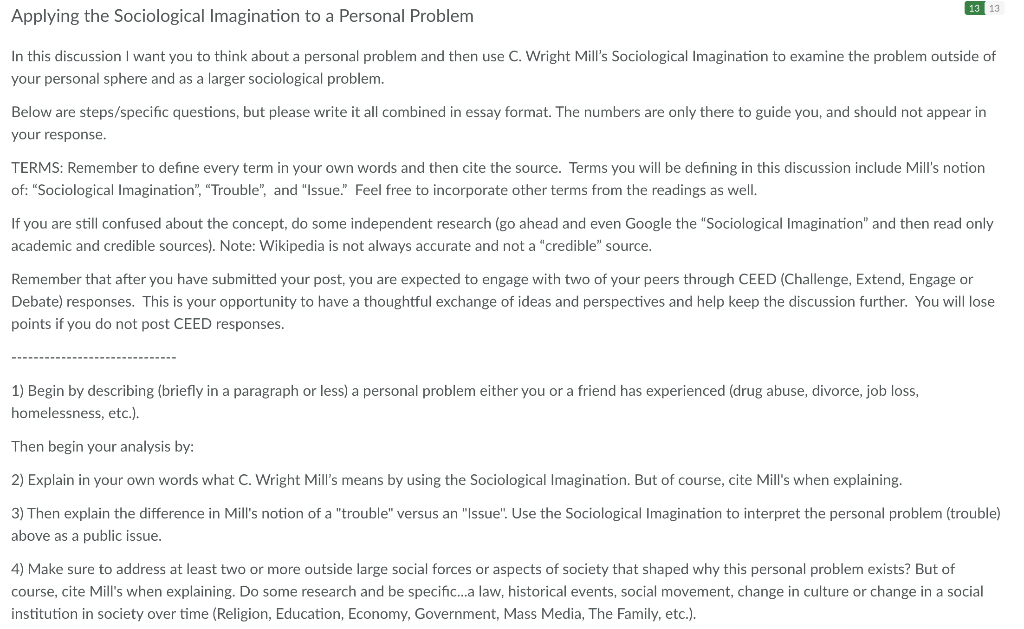Imagine a bustling city street, teeming with people from all walks of life. A young man holds a cardboard sign, pleading for help, while a luxurious car glides past, oblivious to his plight. This simple scene, commonplace in many urban environments, reveals a profound sociological problem: the stark contrast between those who have and those who have not. Understanding how such disparities arise and how they shape our societies is precisely what sociology aims to achieve.

Image: www.chegg.com
Defining a sociological problem, therefore, is not just about identifying an issue. It’s about dissecting its roots, analyzing its impact, and exploring potential solutions. It’s about understanding the complexities of human behavior and how it interacts with the structures of society. This article dives deep into the fascinating world of defining sociological problems, unraveling its intricacies and revealing how it impacts our lives.
The Essence of a Sociological Problem: More Than Just a Social Issue
While every societal concern can appear as a “problem” at first glance, a sociological problem requires a specific set of characteristics. It’s not merely a personal trouble, but a public issue: a pattern that affects a considerable portion of society, often rooted in systemic inequalities or social structures. For instance, just because an individual struggles to find work doesn’t automatically signify a sociological problem. However, if a large segment of the population faces consistent unemployment due to economic or political factors, that becomes a matter of sociological concern.
Identifying the Roots: Delving into the Causes
To define a problem sociologically, we need to go beyond mere observation and investigate its origins. What are the underlying factors contributing to this issue? This crucial step often involves exploring:
- Social Structures: How do institutions like government, education, healthcare, or the economy facilitate or exacerbate the problem? Examining the rules, norms, and hierarchies within these institutions can shed light on its origins.
- Social Norms and Values: What cultural beliefs, traditions, and societal expectations influence the problem? Often, deeply entrenched social values can contribute to or even perpetuate inequalities.
- Power Dynamics: Who holds power and privilege in this situation? How does the distribution of power impact the problem?
- Historical Context: What historical events or circumstances played a role in shaping the present-day issue? Often, understanding the past provides valuable insight into the present.
The Power of Observation: Tools of the Trade
Sociologists employ a range of tools and methodologies to define and understand sociological problems. Some of the most common approaches include:
- Quantitative Research: Employing statistical data analysis to identify patterns and trends related to the problem.
- Qualitative Research: Utilizing interviews, focus groups, and ethnographic observation to gain rich, nuanced insights into individuals’ perspectives and experiences.
- Content Analysis: Examining media, texts, and other forms of cultural artifacts to assess prevailing attitudes and narratives related to the problem.

Image: www.slideshare.net
The Importance of Perspective: Embracing Multifaceted Views
Defining a sociological problem is not a rigid, one-size-fits-all process. It requires embracing diverse perspectives and considering multiple interpretations. For instance, poverty is often defined by its economic dimension. However, a sociological perspective recognizes that poverty also involves social stigma, limited access to resources, and a sense of powerlessness, all of which contribute to its complexity.
Empowering Action: Defining a Path Forward
Defining a sociological problem is not just about understanding its origins, but about formulating strategies for change. By analyzing the problem’s roots, sociologists can identify potential interventions and policy solutions. Moreover, exposing inequalities and challenging societal norms prompts individuals to act as agents of change in their communities.
Building Bridges: The Role of Collaboration
Defining a sociological problem rarely occurs in isolation. It often involves collaboration between researchers, policymakers, and community members. This collaborative approach ensures that research findings are relevant to real-world challenges and that potential solutions are grounded in the lived experiences of those affected by the issue.
Beyond the Data: The Human Experience
Defining a sociological problem ultimately involves acknowledging the human experience at the heart of every issue. While quantitative data and theoretical frameworks are essential, remembering the stories of individuals and communities affected by these problems is crucial. For instance, reading the firsthand accounts of individuals living in poverty brings depth and humanity to the topic.
Finding Hope in Defining Problems: The Promise of Progress
Defining a sociological problem is not always easy. It requires confronting difficult truths about society’s flaws and inequalities. Yet, this process ultimately leads to greater understanding, empowerment, and the promise of progress. By shedding light on the complexities of these problems, we can work towards more just and equitable societies for all.
Expert Insights and Actionable Tips
Dr. Sarah Jones, a prominent sociologist specializing in social inequality, emphasizes the importance of critical thinking when defining a sociological problem: “We must question assumptions, challenge dominant narratives, and consider alternative perspectives to fully understand the issue.” Dr. Jones advocates for interdisciplinary collaboration to address complex social problems. She suggests that sociologists should work with professionals from other fields, such as economics, psychology, and public health, to develop comprehensive solutions.
Defining A Sociological Problem Involves
Call to Action: Joining the Conversation
Defining a sociological problem is not just an academic exercise; it’s a call to action. The insights gained from this process provide the tools and knowledge to engage in meaningful change. Whether you are a student, a community leader, or simply a concerned citizen, understanding the complexities of social problems empowers you to contribute to a more just and equitable future.
Take the first step. Share your thoughts and experiences on the issues that resonate with you. Explore resources from reputable organizations dedicated to social justice and research. Your voice matters, and together, we can build a society that embraces compassion, understanding, and the promise of progress for all.






